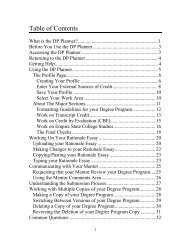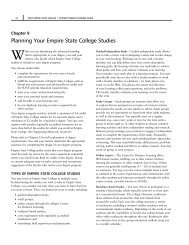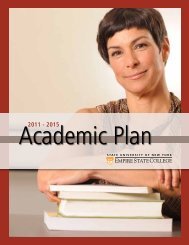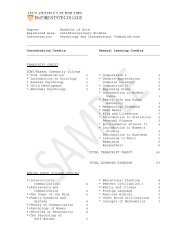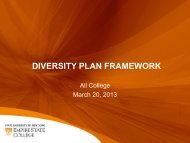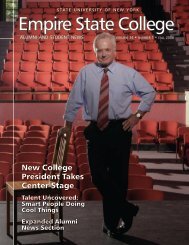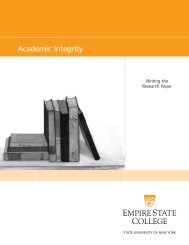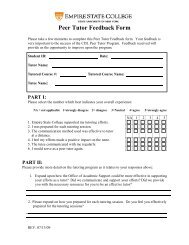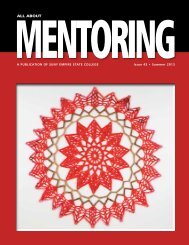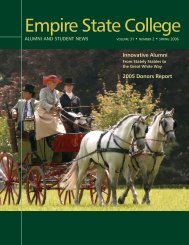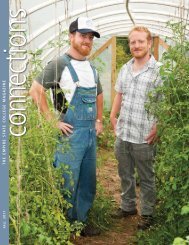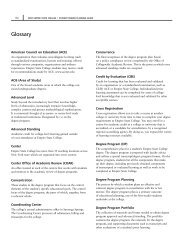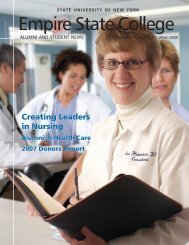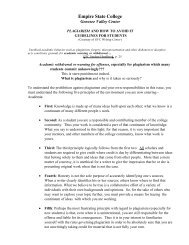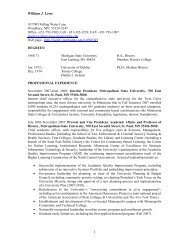All About Mentoring Spring 2011 - SUNY Empire State College
All About Mentoring Spring 2011 - SUNY Empire State College
All About Mentoring Spring 2011 - SUNY Empire State College
Create successful ePaper yourself
Turn your PDF publications into a flip-book with our unique Google optimized e-Paper software.
51<br />
War veteran and author of Semper Fi James<br />
Swofford, wrote “ … the most complex and<br />
dangerous conflicts, the most harrowing<br />
operations and the most deadly wars, occur<br />
in the head” (p. 298). Many veterans go for<br />
years without talking about what they have<br />
witnessed or done in war. They don’t think<br />
their families and friends can understand<br />
what they have lived through, and they are<br />
afraid that expressing their thoughts and<br />
especially their feelings will make them look<br />
weak. Writing gives them a way to tell their<br />
stories, and share them when and if they are<br />
ready. One of our military students wrote:<br />
The course’s written assignments<br />
brought my family closer to<br />
understanding my experiences while at<br />
war, and my strange way of looking at<br />
things. I had to write about topics that<br />
I would just as soon forget. This was<br />
a good thing for me. It opened up the<br />
flood gates to my locked up feelings. I<br />
wasn’t comfortable writing at a college<br />
level, so I sent my papers to my family<br />
to proofread them. This was my way of<br />
opening up.<br />
Along with the nonmilitary students in the<br />
study, we had the opportunity to go beyond<br />
preconceived ideas and stereotypes of the<br />
military and to better understand how our<br />
communities, families and soldiers are all<br />
changed by war.<br />
When we asked students to discuss whether<br />
their thinking about war and its impact<br />
changed during the term, and, if so, what<br />
influenced their thinking, their responses<br />
were honest and insightful.<br />
Keeping a journal, interestingly enough,<br />
seems to be especially valued by the students<br />
with military experience. Chris wrote about<br />
the importance of keeping a journal:<br />
I kept up with my journaling every two<br />
or three days and it was a big help to<br />
me. It has helped me put to paper many<br />
feelings that I needed to deal with.<br />
Many of the things I have put down<br />
in my journal have been very thoughtprovoking<br />
and have helped me reopen<br />
many doors of events and emotions<br />
that I have closed and that needed<br />
to be reopened.<br />
Kim, who’d had no military experience,<br />
commented on how important the journal<br />
was for her to sort through what she<br />
was encountering:<br />
I felt that many of the stories we read<br />
triggered many emotions that I was<br />
not always sure where they came from<br />
but after writing in my journal, I was<br />
able to put some of the emotions into<br />
perspective. Having never experienced<br />
war firsthand there were times when it<br />
was very difficult to handle some of the<br />
information that we read. I have never<br />
really talked about war with people<br />
who have served.<br />
Other comments included one man<br />
admitting that the course had required him<br />
to keep an open mind because he so strongly<br />
opposes the current wars, as well as this<br />
statement from someone who thought the<br />
course was going to be quite different:<br />
Prior to attending the course, I expected<br />
to have previous war veterans as<br />
classmates who have recently returned<br />
from Iraq. I had envisioned two hours<br />
of chest pounding and hoorahs from<br />
the participants. On the contrary there<br />
was a mix of people from various<br />
backgrounds who shared very different<br />
views on the subject.<br />
An active-duty military student, who has<br />
served in both Iraq and Afghanistan, wrote:<br />
I never felt judged during the class.<br />
I could speak my mind and true feelings<br />
about war without ever worrying about<br />
being condemned for them or my<br />
actions. If the mood in the classroom<br />
had been different, I never would have<br />
been so outspoken. I actually looked<br />
forward to class, despite working<br />
all day.<br />
Another student veteran wrote:<br />
War Story’s [sic] was brain food for<br />
me … . War Story’s covered every<br />
angle from liberal to conservative, from<br />
war-numb civilian to the war-wrung<br />
veteran. You knew what you had to do,<br />
but how you were to feel, think and<br />
write was up to you.<br />
We learned a great deal about our student<br />
veterans as a cohort from creating and<br />
teaching War Stories. Military students,<br />
we found, often arrive with training and<br />
skills that make them potentially excellent<br />
students. We have found many of them<br />
to be determined and highly disciplined,<br />
attributes that can make them dedicated<br />
and motivated learners. They often arrive<br />
understanding the value of critical and<br />
creative thinking skills, paramount to<br />
problem solving, improvisation and their<br />
survival in combat situations. Military<br />
personnel understand the necessity for good,<br />
clear communication and can be taught<br />
to further develop these skills in writing.<br />
Many people who have served in recent<br />
wars are Reservists and are older. Beyond<br />
their military experience, they have rich<br />
life experience to which they can relate<br />
and connect their learning, making them<br />
potentially deep and committed learners.<br />
As a rule, our student veterans dislike<br />
ambiguity; they like structure and certainty.<br />
The military culture is all about goals,<br />
objectives and timelines. When you can put<br />
academic work in that context it is easier<br />
for them. Respect is big with them, and<br />
they respond well when it is clear that we<br />
respect their experience and perspective.<br />
<strong>Empire</strong> <strong>State</strong> <strong>College</strong>’s many study options,<br />
from online studies to tutorials, allow<br />
veterans to exert control over their learning<br />
environment and increase the chances of<br />
academic success. The college’s mentoring<br />
model provides these students with support<br />
I could speak my mind<br />
and true feelings about<br />
war without ever<br />
worrying about being<br />
condemned for them or<br />
my actions.<br />
and resources that might be more difficult<br />
to learn about on a conventional campus.<br />
The opportunity to build a relationship<br />
with someone who can explain and help the<br />
student veteran with academic decisions may<br />
be invaluable.<br />
Civilian life is slow compared to being<br />
in a combat situation. Active and<br />
recently deployed, and nonactive military<br />
suny empire state college • all about mentoring • issue 39 • spring <strong>2011</strong>



